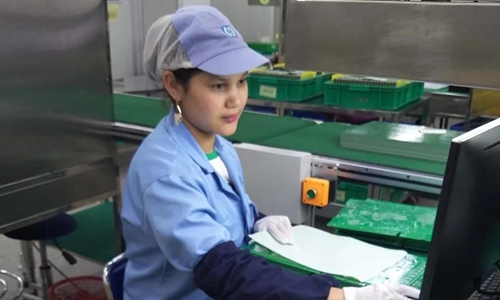After releasing a report in February claiming at least 80,000 Uygurs were being forced to work in factories in other cities in China, the Australian Strategic Policy Institute (ASPI) hyped the "forced labor" topic by releasing another interview with the authors of the report on April 24.
However, the Xinjiang Development Research Center conducted a survey by visiting and talking to more than 50 Uygurs working in inland cities, including in Jiangxi and Fujian provinces, and found that the ASPI report was made up of groundless stories to support the West in pressuring China. Its purposes are to deprive the working right of workers from Xinjiang, to affect the confidence of foreign companies in China and to contain China.

Esa Yunus
"We really want to see many inland cities"
Esa Yunus is a villager from Lop county of Hotan Prefecture and had never left his village. But in 2018, after seeing an advertisement in a local talent market, he decided to go to work in a technology company in Nanchang of Jiangxi Province.
"My hometown is good, and I grew up there. But it is too small. I want to see the big world," Esa told the Global Times.
When the Global Times reporters reached him, he was busy working on the production line processing digital screens for cell phones for his company.
"Compared with inland cities, Hotan has fewer enterprises and jobs for young people like me and the salary here is higher," he said.
By working for the company, Esa not only achieves his own goals but also improves the livelihood of his family - he bought a washing machine and electric-powered cart for the family; and supports his brother and sister to go to school.
Ebibra Mamut from a poverty-stricken family in Ayikule town of Aksu Prefecture had a similar experience to Esa. He went to work for an electrical appliances company in Hangzhou of East China's Zhejiang Province in 2018.
He gradually became a skilled worker and helped his family get out of poverty within one year.
According to data from authorities in Xinjiang, about 151,000 people from poverty-stricken families in southern Xinjiang have been working in inland cities since 2018. They got their jobs through introductions by their countrymen, relatives or through local job markets.
Most of them work in fields such as electrical appliance companies, food production, garment and shoe factories, and the catering industry. The average yearly income is above 45,000 yuan ($6,358), which is higher than their income as farmers.

Abulmit Metkurban
"Can forced labor be as free as us?"
Abulmit Metkurban and his wife Arzgu from Ayimak village of Moyu county in Hotan is working for an electrical appliance company in Guangdong Province in 2017. They can earn more than 8,000 yuan ($1,130) a month.
The Global Times reporters saw the couple in the plant. In response to questions on whether they were forced to work here, Abulmit laughed.
"How can this be possible? How can forced labor be so free? Do not listen to some foreigners' nonsense," he said.
Abulmit told the Global Times that they would learn more about a city before deciding to go to work there, including the weather, the job, accommodation conditions and the pay.

Arzgu
Arzgu said that "many people in our village want to have jobs in inland cities and those who said we are forced to work here must have some purpose.
"Many people from southern Xinjiang working in inland cities ask to extend their contracts and some introduce friends or relatives to the same companies.
Pashagul Kermu from the Kizilsu Kirgiz Autonomous Prefecture began to work in Dongguan of Guangdong Province several years ago. She not only works to help get her family out of poverty, but also leads more than 500 people from the prefecture to work in Guangdong. She also has won many awards for helping these people get rid of poverty in 2018.

Nurmangul Abudsad and her roommates
"I get the feeling of being at home"
Nurmangul Abudsad is a villager from Aketao county of the Kizilsu Kirgiz Autonomous Prefecture. Together with 11 friends, she began to work for an electrical appliance company in Ningbo of Zhejiang Province in January 2019.
She now lives in a four-person-dormitory, where they have a TV, washing machine, air-conditioner and other living facilities.
"Before leaving my hometown for a job here, I was worried that I may not adapt to life here since it was the first time that I had left my family. But after coming here, I found I was worried unnecessarily," she said.
Nurmangul said that the company held a welcoming ceremony for the new employees and signed labor contracts on site. The company also pays for some health insurance for them.
In order to help newcomers become familiar with the environment quickly, the company arranges "pals" from the same place for them.
"Leaders of the company would also celebrate some festivals, including the Eid ul-Fitr and the Corban Festival with us. The company would also send birthday cakes for us and organize parties and we would dress in our ethnic clothes and sing and dance happily. I feel like I'm at home," she said.
Nurmangul said they also have a halal canteen, which serves dishes from Xinjiang.
In order to protect the legal interests of migrant workers from Xinjiang, the labor union in Xinjiang has started working mechanisms with provinces and cities where these workers live to deal with their problems in daily life.
"We firmly oppose such report!"
All these people's stories show the opposite to what the ASPI report claimed. And interviewees expressed their anger toward such lies and malicious slander.
They said everyone has the right to pursue a happy life no matter which ethnic group he or she is from or where they live. The ASPI report, which seemed to "defend" Uygur migrant workers, actually hurt them and deprived them of jobs.
"Without working, how do we make a living? Without working, how could we get rid of poverty? Without working outside, how can we know the outside world is developed? We firmly oppose the report," they said.
A report by The Grayzone, a US-based news outlet, revealed that ASPI has long received money from the US government and arms industry and spreads rumors to slander China.
To cooperate with its backers, the institute compiled a biased and groundless report to smear China's policies in Xinjiang. It purposely distorted Xinjiang people's working in inland cities as "forced labor" to pressure Chinese companies, affect foreign companies' confidence in China and to achieve their malicious conspiracy, experts said.
